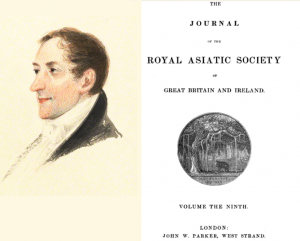The following is an excerpt from a paper read by Professor HH Wilson on 25th April 1846. This paper was published in The Journal of the Royal Asiatic Society of Great Britain and Ireland
 The succession of the son of Tegh Bahadur—Guru Govind—constitutes the most important era in the political progress of the Sikhs. He, in fact, changed the whole character of the community, and converted the Sikhs of Nanak, the disciples of a religion of spirituality and benevolence, and professors of a faith of peace and goodwill, into an armed confederacy, a military republic. The worship of “steel” was combined with that of the “book,” and instead of attempting to unite Mohammedans and Hindus into one family fraternity, he made his disciples vow implacable hatred to the followers of Mohammed. He finally abrogated the distinction of caste, and opened his ranks to every description of persons, even to the very lowest Hindus, assigning to all his military adherents the name of Sinh —or lion—a term peculiar to the Rajput Hindus. His followers were enjoined always to have steel about their persons, to wear blue dresses, to let their hair grow, and to use as phrases of salutation, as a war cry, or as responses in prayers, the sentences; “Wah! Guru ji ka khalsa : Wah! Guru ji ka fatteh” “Hurra! for the unity of the Guru: Hurra! for the victory of the Guru” expressions that have been since in use even among the more genuine descendants of Nanak, the Udasis, and Nirmalas.
The succession of the son of Tegh Bahadur—Guru Govind—constitutes the most important era in the political progress of the Sikhs. He, in fact, changed the whole character of the community, and converted the Sikhs of Nanak, the disciples of a religion of spirituality and benevolence, and professors of a faith of peace and goodwill, into an armed confederacy, a military republic. The worship of “steel” was combined with that of the “book,” and instead of attempting to unite Mohammedans and Hindus into one family fraternity, he made his disciples vow implacable hatred to the followers of Mohammed. He finally abrogated the distinction of caste, and opened his ranks to every description of persons, even to the very lowest Hindus, assigning to all his military adherents the name of Sinh —or lion—a term peculiar to the Rajput Hindus. His followers were enjoined always to have steel about their persons, to wear blue dresses, to let their hair grow, and to use as phrases of salutation, as a war cry, or as responses in prayers, the sentences; “Wah! Guru ji ka khalsa : Wah! Guru ji ka fatteh” “Hurra! for the unity of the Guru: Hurra! for the victory of the Guru” expressions that have been since in use even among the more genuine descendants of Nanak, the Udasis, and Nirmalas.
Guru Govind was an author as well as a soldier, and has left a record of his own exploits, in a work called the Vichitra Natak, forming the first portion of a larger compilation which shares with the Adi Granth the reverence of the Sikhs. It is called the Dasama Padshah ka Granth, the Book of the 10th King.
(Page 43)
Horace Hayman Wilson (26 September 1786 – 8 May 1860) was an English orientalist. He studied medicine at St Thomas’s Hospital, and went out to India in 1808 as assistant-surgeon on the Bengal establishment of the British East India Company. In 1811 Wilson was appointed secretary to the Asiatic Society of Bengal. He was a member of the Medical and Physical Society of Calcutta and was an original member of the Royal Asiatic Society, of which he was director from 1837 up to the time of his death. Wilson was the first person to translate the Rigveda into English.

Leave a Reply